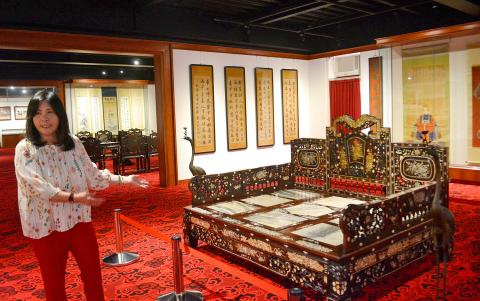A private museum in Taichung dedicated to Lin Hsien-tang (林獻堂), a politician and activist who advocated self-rule, is to have its grand opening today, the city’s Cultural Affairs Bureau said.
Experts have vetted the Lin Hsien-tang Museum’s substantial collection of artifacts for authenticity and historical value according to the Museum Act (博物館法), the bureau said on Tuesday.
The private museum is the first of its kind in the city and the second in the nation, it added.

Photo: Chen Chien-chih, Taipei Times
As a leading voice in petitioning the former Japanese empire to establish a Taiwanese parliament, Lin earned the nicknames “Father of the Taiwanese Parliament” and “Taiwan’s First Citizen,” said Lin Fang-ying, chairwoman of Ming Tai High School, which founded the museum.
A descendent of Lin Hsien-tang, she had collected more than 10,000 objects linked to him and the Lin clan, she said, adding that she donated them to the memorial wing the school had dedicated to him.
The museum’s opening would coincide with the 70th anniversary of the high school, which Lin Hsien-tang cofounded with other gentry from Taichung, she said.
For the past two years, the school has planned to upgrade the Lin Hsien-tang memorial wing into a proper museum, increasing its floorspace from 100 ping (331m2) to 250 ping and tripling the collection of artifacts, she said.
The collection contains items such as Lin Hsien-tang’s diary, manuscripts and other historical documents of note, including calligraphy by renowned Chinese philosopher Liang Qichao (梁啟超) created in 1911 to mark his visit to the Lin residence, she said.
Other antiques — such as a 150-year-old camphor cabinet, chairs with shell inlays, a redwood bed, utensils and deeds belonging to the Lin clan — deal broadly with the material culture of the late Qing Dynasty and Japanese colonial eras, she said.
The museum is awaiting several explanatory labels for the artifacts, she said, adding that the school’s board of trustees hopes they will provide young Taiwanese with insight into the history that forms their shared heritage.

Taiwan is to commence mass production of the Tien Kung (天弓, “Sky Bow”) III, IV and V missiles by the second quarter of this year if the legislature approves the government’s NT$1.25 trillion (US$39.78 billion) special defense budget, an official said yesterday. Commenting on condition of anonymity, a defense official with knowledge of the matter said that the advanced systems are expected to provide crucial capabilities against ballistic and cruise missiles for the proposed “T-Dome,” an advanced, multi-layered air defense network. The Tien Kung III is an air defense missile with a maximum interception altitude of 35km. The Tien Kung IV and V

The disruption of 941 flights in and out of Taiwan due to China’s large-scale military exercises was no accident, but rather the result of a “quasi-blockade” used to simulate creating the air and sea routes needed for an amphibious landing, a military expert said. The disruptions occurred on Tuesday and lasted about 10 hours as China conducted live-fire drills in the Taiwan Strait. The Civil Aviation Administration (CAA) said the exercises affected 857 international flights and 84 domestic flights, affecting more than 100,000 travelers. Su Tzu-yun (蘇紫雲), a research fellow at the government-sponsored Institute for National Defense and Security Research, said the air

Taiwan lacks effective and cost-efficient armaments to intercept rockets, making the planned “T-Dome” interception system necessary, two experts said on Tuesday. The concerns were raised after China’s military fired two waves of rockets during live-fire drills around Taiwan on Tuesday, part of two-day exercises code-named “Justice Mission 2025.” The first wave involved 17 rockets launched at 9am from Pingtan in China’s Fujian Province, according to Lieutenant General Hsieh Jih-sheng (謝日升) of the Office of the Deputy Chief of the General Staff for Intelligence at the Ministry of National Defense. Those rockets landed 70 nautical miles (129.6km) northeast of Keelung without flying over Taiwan,

A strong continental cold air mass is to bring pollutants to Taiwan from tomorrow, the Ministry of Environment said today, as it issued an “orange” air quality alert for most of the country. All of Taiwan except for Hualien and Taitung counties is to be under an “orange” air quality alert tomorrow, indicating air quality that is unhealthy for sensitive groups. In China, areas from Shandong to Shanghai have been enveloped in haze since Saturday, the ministry said in a news release. Yesterday, hourly concentrations of PM2.5 in these areas ranged from 65 to 160 micrograms per cubic meter (mg/m³), and pollutants were